- Home
- Anne Bennett
A Mother's Spirit
A Mother's Spirit Read online
A Mother's Spirit
Anne Bennett
* * *
Synopsis
From rural rags to brief riches and back to ruin, this is a moving saga of hard work, bad luck and finally hope for a family's future.
Gloria Sullivan can't quite believe where she has ended up. Growing up with no money worries, she fell head over heels in love with the handsome, hardworking Irishman employed by her father. They were the golden couple - until the Wall Street crash, when everything was lost. Finally she agreed to start again in London with husband Joe and their small son. World War Two was raging, and Joe laboured on the docks by day and fighting fires by night. He was a hero - but one dreadful fire left him terribly injured. Once more Gloria resolved to leave everything behind and to take Joe home to his family farm in Ireland, his only hope of recovery. Gloria now dutifully nurses her husband, but she can't settle in the countryside. Then a nearby American base begins recruiting civilians. Gloria tells everyone it's her chance to do her bit - but will she be...
ANNE BENNETT
A Mother’s Spirit
To my grandson Theo, the youngest Bennett boy,
with all my love
Contents
Title Page
Dedication
Chapter One
Chapter Two
Chapter Three
Chapter Four
Chapter Five
Chapter Six
Chapter Seven
Chapter Eight
Chapter Nine
Chapter Ten
Chapter Eleven
Chapter Twelve
Chapter Thirteen
Chapter Fourteen
Chapter Fifteen
Chapter Sixteen
Chapter Seventeen
Chapter Eighteen
Chapter Nineteen
Chapter Twenty
Chapter Twenty-One
Chapter Twenty-Two
Chapter Twenty-Three
Chapter Twenty-Four
Chapter Twenty-Five
Chapter Twenty-Six
Chapter Twenty-Seven
Acknowledgements
About the Author
By The Same Author
Copyright
About the Publisher
ONE
‘Please let me come with you, Daddy?’ Gloria Brannigan pleaded with her father that afternoon, as he prepared to leave the house.
Brian looked into the appealing eyes of his daughter, the child he loved more than life itself, and shook his head. ‘I cannot take you to the docks, my dear,’ he said. ‘Your mother would—’
‘Mother has retired to bed with a sick headache,’ Gloria said, almost triumphantly.
‘And what about the cold that has laid you low now for almost a week so that you have been unable to go to school?’ Brian asked with a wry glance at her.
‘That is quite gone, Daddy, and I could have gone to school today but you know how Mother fusses so!’ Gloria told him. ‘The fresh air might even be good for me,’ adding, as her father seemed unconvinced, ‘You could even claim the trip to be educational.’
‘And just how do you work that one out?’
‘Well, the things unloaded in New York are from all different countries, aren’t they? I could make a list of them and later I could look them up on my globe.’
‘I think not, darling,’ Brian said regretfully.
‘Oh, go on, Daddy,’ Gloria urged. ‘I am so bored, and the docks are exciting. I like to hear the sailors calling to each other in their own languages.’
‘It’s the languages you can understand that worry me,’ Brian said grimly. ‘Sailors’ talk is not for the ears of young ladies.’
‘Oh, Daddy, don’t be so stuffy,’ Gloria said. ‘Anyway, I shall be too interested in everything else to listen to anything unsuitable.’
Brian gave a throaty chuckle. ‘All right, you cheeky monkey,’ he said. ‘You win. I was taking the smaller carriage anyway, because Bramble can pull that and a bit of exercise will do him good. The pony’s been a bit skittish of late, with you not being able to exercise him. I suppose you know that I will catch it in the neck good and proper for encouraging you to play truant?’
‘You didn’t encourage me, Daddy,’ Gloria protested. ‘It was me persuading you.’
‘Your mother will not see it that way,’ Brian said, with a rueful grin. ‘It’s a good job that I have such a broad back.’
‘Well, I think you are a lovely, kind daddy,’ Gloria said, winding her arms around his neck. ‘In fact, the best daddy in the whole world.’
Brian felt tears prickle the back of his eyes. This child was the only one he would ever have, because of what Norah had suffered at their daughter’s birth. Gloria, however, made up for any son Brian may have hankered after. Her hair was the colour of spun gold and hung in natural ringlets, which she tied back with a ribbon that always matched her dress. Then there were those unusual and very beautiful violet eyes, encircled with long, black lashes and the wide and generous mouth, the only feature she had inherited from him.
‘We must hurry,’ he said. ‘There is not much daylight in these winter days. I will send Tilly in to you to help you get dressed in your outdoor things. The day is bone-chillingly cold and you will need to be well wrapped up.’
Gloria watched her father leave the room with a smile playing around her mouth. At fourteen years old, she was well aware that she could twist him around her little finger.
Joe Sullivan had been appalled by the conditions on board the liner bound for New York. It had been anchored in the deeper waters of Lough Foyle, and he had boarded it from a tender sent out from the pier at Moville in southern Donegal in Ireland two weeks before. He had been excited and in good spirits at being en route to America – the one place to which he had so longed to go.
However, all the steerage passengers had been housed in the bowels of the ship, and many, including Joe, had been sick for the first few days as the ship was tossed about in the turbulent ocean. The weather had been too bad for the hatch to be opened often, to enable the passengers to climb on deck, and so the air in their quarters quickly grew fetid and stale, and soon smelled of vomit.
Joe took every opportunity to be outside, despite the fact that the wind cut through him. Throughout the voyage, the wind whipped the waves into gigantic breakers fringed with white, which constantly crashed against the ship.
November was not a good time to travel the ocean, Joe decided and he would remember that in future, and he had been extremely glad to reach Ellis Island. As he queued to disembark, he looked to the New York skyline with its skyscrapers, which some of the fellows on the ship had told him about. What a sight it was, and as unlike the skyline of his home town of Buncrana, County Donegal as it was possible to be.
The huge Statue of Liberty dominated the waterfront. Liberty was what every Irishman dreamed of. His young brother, Finn, had given his life in the Great War because Britain had promised the Irish their freedom if they helped them fight the Hun. Here in New York, America, Joe was sure he would experience real freedom, and he was filled with exhilaration at the prospect.
First, though, he had to go through the procedure on Ellis Island, where he would be prodded, poked, examined, tested and questioned, to ascertain that he was fit to enter America. He wasn’t worried about the physical examination, for he knew he was as fit as anyone else – fitter than most, in fact. Work all his life on the farm had seen to that.
The three Rs Joe had learned at the school in Buncrana run by the Christian Brothers where, if you weren’t inclined to learn in the normal way, the lesson would be beaten into you. Joe had always had a healthy respect for the cane. His mother had had a similar one and he had felt its sting often. So he
had learned as much as he felt he needed, and more than enough to please the Brothers, and now could give a good enough account of himself.
Everyone entering America had to have a sponsor waiting for him or her. Joe might have easily been on the next boat back if it hadn’t been for a neighbour, Patrick Lacey, who had travelled the same route as Joe five years earlier. He would never have touched American soil himself if it hadn’t been for an uncle willing to sponsor him until he got settled, and he offered to do the same for Joe Sullivan.
Joe stood at one side of the table and three stern-faced men sat the other side of it, checking all the tests he had passed and scrutinising the letter closely. Then one said, with a slight smile as he returned the letter to him, ‘That seems to all be in order, Mr Sullivan, and as you passed everything else satisfactorily, there will be no need to detain you on Ellis Island any further. Pack up your things. You will be leaving on the tide today.’
‘Yes, sir,’ said Joe. ‘And thank you, sir.’ A frisson of excitement began in his toes and spread throughout his whole body. Friday, 18 November 1921, and he was on his way.
Gloria was blissfully happy having her daddy to herself. The steamship he was waiting for hadn’t begun unloading yet, so Gloria was able to drink in the sights, sounds and smells of the docks as they walked together.
There were sailors everywhere, shouting and calling out to each other, and the steamship funnels belching out grey smoke into the much greyer sky. Goods being unloaded clattered down the gangplanks, and barrels being rolled rumbled along the dockside.
And everyone was so pleasant. Some of the sailors, mostly the foreign ones, Gloria noticed, gave her a wink or called out to her, for she was a pretty child with a ready smile.
Bert Clifford, who managed the factory that her father owned, was especially nice to her and always called her Miss Gloria, as if she was a real lady. He knew which side his bread was buttered, for his boss doted on the child. It was easy to be nice to her too, she was such a comely little thing.
Whispery trails of vapour escaped from people’s mouths when they spoke, and yet Gloria hardly felt the cold, wrapped as she was in a beautiful blue woollen coat with a cape of the same material over her shoulders. A matching bonnet was tied under her chin over the golden ringlets, framing her face and making her eyes look bigger than ever, thick black stockings encased her legs, soft black leather boots went halfway up her calves, and her hands were buried in a black fur muff.
‘Funny how you like the docks so much,’ Brian mused. ‘I must admit I was much the same when I was young. Course, there were some sailing ships about then, but not many. Some ships used steam, but had sails as well. What a sight it was to see those – majestic almost – and yet totally inefficient. A ship could be becalmed for days, weeks even sometimes, whereas now, why, the passage from England takes two weeks or less, they tell me. Like that one there, with the passengers waiting to disembark.’
The passenger ships’ pier was a little further along the harbour than those of the trading boats.
‘So, that one’s from England?’
‘Aye, and Ireland,’ Brian said. ‘It picks up first at a little place called Moville and then Belfast and on to Liverpool before coming here.’
‘I’d love to go to Ireland,’ Gloria said. ‘See the place where you were born and raised, Daddy.’
‘And so you shall, my dear, one day,’ Brian said. ‘But Ireland at the moment is not a place for anyone to visit. It is a bed of unrest, I believe. And for the life of me I cannot see what is so wrong in wanting to govern your own country. Anyway, it means the poor unfortunate people are all coming here, hoping for a better life, though it often turns sour for them.’
There was a sudden cry from Bert Clifford and Brian turned. ‘They’re beginning to unload,’ he said to Gloria. ‘You sit in the carriage for a while now and wait for me.’
‘Oh, Daddy…’
‘No,’ Brian said. ‘You must obey me in this. You will only be in the way and anyway, I’ll not be able to watch you.’
‘I don’t need watching, Daddy.’
‘You think not?’ Brian said, with a lift to his eyebrows. ‘I didn’t at all like the way some of the sailors were smiling and winking at you.’
‘I didn’t think you noticed.’
‘I notice everything about you, my dear,’ Brian said with a smile. ‘Now then, you be a good girl and I will take you for tea at Macy’s afterwards. What do you say?’
Gloria’s answer was in the smile she gave her father, as she kissed him on the cheek before climbing into the carriage without another word of complaint. Macy’s afternoon teas were not to be sniffed at.
She watched her father hurry away towards Bert. She knew there was no reason for him to do this himself, as her mother had said the previous evening. Bert Clifford was an honest and trustworthy man and she couldn’t understand why Brian didn’t just leave him to it.
‘Because it is my business, not his,’ Brian had said. ‘And I want to count those supplies coming off the boat myself, and that is the end of the matter.’
Her mother hated the thought of her husband consorting with common sailors, considering it so unnecessary and degrading. Gloria understood, however, how much her father liked the vibrant clamour and bustle of the docks. He was now lost to her sight in the crowd, and she turned her attention to the immigrant ship just in time to see the gangplanks lowered.
Joe couldn’t wait to explore the place. Those on Ellis Island had changed his money to the American currency before he left, and he jingled the coins in his pocket and thought of the wallet packed with dollar bills, pleased that he had so much of it left. He had been careful and taken part in none of the card schools so many of the other men seemed hooked on. His father had never approved of cards and none had been played in their cottage to while away the winter evenings.
‘A fool and his money are soon parted,’ Thomas John had said when Joe had queried this. ‘Gambling can get a grip on a body. I have seen more than one bet his whole wages on the throw of the dice or a card game, and lose the lot. However did they explain that to their wives and hungry weans when they got home? I often wondered about that and decided a long time ago that gambling wasn’t for me.’
It wasn’t for Joe either because his brother, Tom, still back on the farm in Buncrana, had sold a field and the sheep in it so that Joe could have this chance in America. It had been incredibly generous, and he had been extremely grateful, but he knew there would be no other money if he was to squander this. Although officially Tom was owner of the farm, now that their father had died, their crabbed, spiteful mother held the purse strings. Joe knew he would never get a penny piece from her, and he didn’t know how long the money he had would have to last him until he landed himself a job.
He hoped, though, that Patrick Lacey would help there. Joe’s sponsor had said he would offer him lodging, at least until he got himself straight, and Joe intended looking him up as soon as possible.
The gangplank was down, a cheer went up, and the passengers moved slowly forward, hampered by their cases. Joe’s attention was taken by an altercation on the dockside between a well-dressed man and a sailor over a cask that the man seemed to be demanding the sailor open.
Once it was open, the man withdrew a piece of linen or cotton that had obviously been used as packing. He waved the material aloft, and as he examined the contents of the barrel he started berating the sailor, who appeared to be foreign and was opening his arms helplessly.
It was causing great amusement amongst the disembarking passengers, until suddenly a gust of wind whipped the material out of the man’s hand. It swirled and danced in the air for a while, before settling across the nose and eyes of the pony coupled to a small carriage.
With a shriek, the pony reared on its back legs. The coachman made an abortive dive for the pony, but was struck on the temple by one of its flailing front legs and fell to the ground. Then the pony made a headlong dash for the exit and the main
road beyond, people scuttling out of its path.
Inside the carriage, Gloria tried to see what was happening before she was cast to the floor of the carriage where, tossed from one side to the other, she began screaming her head off.
Joe, nearly at the end of the gangplank, spied a face briefly at the carriage window, and realised that it wasn’t empty, as he had supposed, but that there was a child inside. He dropped his bag and case, leaped to the rail, vaulted over the two people in front of him, hit the ground running and took off after the pony. His father always said he could run like the wind and it was true that he could always beat Tom in a race and he ran that afternoon like the very devil.
As he was drawing level with the pony, he wondered how to get it to stop. He wouldn’t be able to hold it by the reins; the panicked pony would just pull him over and drag him along the ground. There was only one thing for it. Joe knew he had just the one chance and he thanked God that the pony was not large. As he drew almost level he made a superhuman leap and landed on the pony’s back, remembering how, as a game, he and Tom had tried leaping onto their old horse at home.
This, however, was no game. If he was thrown from the pony he would be crushed by the carriage. His heart thumped in his chest as, for quite a few moments, he thought that might happen, as he was at the back end of the frightened and panicky animal, which was desperately trying to dislodge him. His relief when he managed to catch hold of one of the reins was palpable, and he began to pull himself towards the pony’s head.
The animal was scared witless, but Joe began to stroke its mane gently and rhythmically, talking to it softly as he had done to their own horse at home when it had been spooked by something.
At first, he wasn’t sure he was doing any good, and he was only too aware how near they were to the main road. He could hear the traffic and knew if he didn’t stop the pony before the road, it was highly unlikely any of them would survive.

 As Time Goes By
As Time Goes By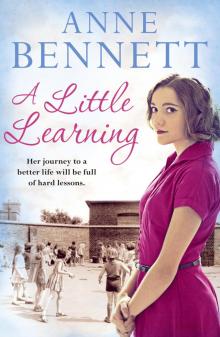 A Little Learning
A Little Learning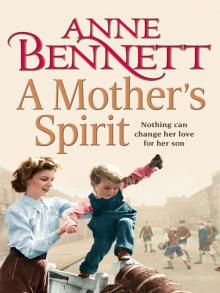 A Mother's Spirit
A Mother's Spirit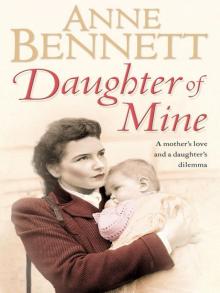 Daughter of Mine
Daughter of Mine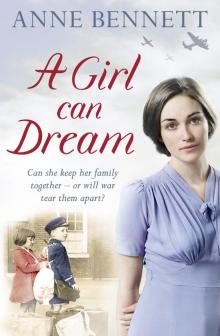 A Girl Can Dream
A Girl Can Dream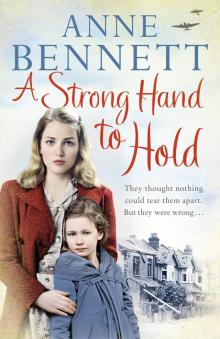 A Strong Hand to Hold
A Strong Hand to Hold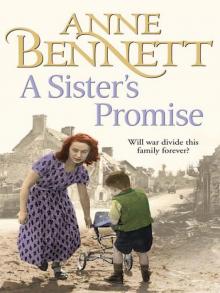 A Sister's Promise
A Sister's Promise To Have and to Hold
To Have and to Hold Pack Up Your Troubles
Pack Up Your Troubles Keep the Home Fires Burning
Keep the Home Fires Burning Another Man's Child
Another Man's Child The Child Left Behind
The Child Left Behind Mother’s Only Child
Mother’s Only Child Forget-Me-Not Child
Forget-Me-Not Child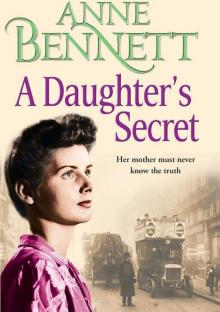 A Daughter's Secret
A Daughter's Secret Walking Back to Happiness
Walking Back to Happiness Far From Home
Far From Home Till the Sun Shines Through
Till the Sun Shines Through